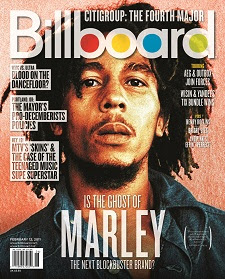by Rob Kenner
In late 1979, a mustachioed "60 Minutes" correspondent named George Negus asked Bob Marley if he was a rich man.
"When you say 'rich,' what you mean?" the reggae superstar replied with a poker face.
Do you have a lot of possessions? Lots of money in the bank?
"Possessions make you rich?" Marley asked skeptically. "I don't have that type of richness. My richness is life, forever."
Though he would succumb to cancer two years later, Marley's words still ring true. The Rasta soul rebel's songs of freedom are more relevant than ever three decades after his death at age 36. "Bob Marley's in every new day," his widow, Rita Marley, says by telephone from her home in Ghana, where she's sponsoring the Africa Unite Youth Symposium at the Institute of African Studies to mark what would have been his 66th birthday on Feb. 6. "There's not one day that his music is not played all over the world."
"Legend," Bob Marley & the Wailers' greatest-hits collection, is the top-selling reggae album of all time, having spent more than 1,126 weeks on the Billboard 200 and Pop Catalog Albums charts. As the first Third World pop star, Marley's fan base is truly global. Revered from Argentina to New Zealand, he's easily the most widely pirated musician on Earth. "I bought a bootleg CD yesterday in Ghana," Rita Marley says with a laugh. "They're on the streets like peanuts. I can't tell you the last time I heard some of these songs, but this guy had 25 songs on one CD. Yes, honey, and they're selling well. That's how they make their living."
"Old pirates yes they rob I," Marley sang in his classic "Redemption Song." And as his son Rohan puts it, "Those pirates are still out there, claiming they have rights." But the former linebacker, known for delivering punishing hits while playing for the University of Miami and the Canadian Football League's Ottawa Rough Riders, has been helping his family tackle piracy.
Though some estimate that the trade in unauthorized Marley music and merchandise exceeds $600 million each year, attorney Tim Ervin deals with the hard numbers: "Given the efforts that the family employs, I don't believe the problem is nearly that extensive," says Ervin, who has represented the Marleys since 2000. (His firm also does intellectual property protection for the estates of Elvis Presley and Johnny Cash.) Though he doesn't work on Marley music, downloads or DVD rights, on the merchandising side, the family has been vigilant in protecting Marley's legacy. "The Marleys have served over 400 cease-and-desist letters in the past 11 years," he says. "We've initiated 30 lawsuits in the United States alone."
Two weeks ago team Marley won a major victory when a Las Vegas court ruled that Avela, a Reno, Nev.-based company that sold unauthorized Bob Marley merchandise to retailers like Target and Walmart, must pay the singer's estate at least $300,000 in damages. "They were selling all sorts of products," Ervin says. The most offensive of which were Bob Marley bobblehead dolls and plush toys, he says. "That really incensed my client."
The case was filed in 2008 by Marley family company Zion Rootswear, which owns the exclusive worldwide license to make Bob Marley clothing. In addition to the $300,000 in damages awarded under Nevada state law, there's also a federal claim that was scheduled to be heard on Feb. 4 in U.S. District Court in Las Vegas. "We have submitted evidence that the company had $3 million in sales," Ervin says. "Based on the fact that the jury found that they willfully infringed, the judge has the power to double or triple that figure, and award us our attorney's fees on top."
"This verdict sends a clear message to anyone who would challenge the integrity of our father's legacy," Rohan said in a written statement. "We will continue to aggressively pursue legal actions against those who attempt to unfairly profit from his life and legacy."
Rita and Bob's firstborn child, Cedella, who has long served as CEO of Tuff Gong International and director of the Bob Marley Foundation, as well as overseeing most of the Marley family businesses, has been fighting for her rights as long as she can remember. "The best part about the Nevada case‹apart from winning it," she says, "was that our lawyer made people realize that we had to put up money to buy these rights, that normally a child would have."
"Dad passed without a will," says Cedella, who was 14 at the time. Under Jamaican law, her father's estate was to be sold and divided among his wife and 12 children. During the Las Vegas court proceedings, Marley's attorney said the singer's family paid $11 million to buy the rights to his identity.
"We borrowed the money, we paid it back, and it was ours for life," Cedella says. "That is part of the reason why we defend it so much. It was not something that was given to us."
"It's a big responsibility we have, running the business," says Rita, who notes that past partners and administrators tried to "mash up a company that's been formulated and worked for by a Rastaman . . . The expectation is that we're only good for ganja-smoking."




No comments:
Post a Comment